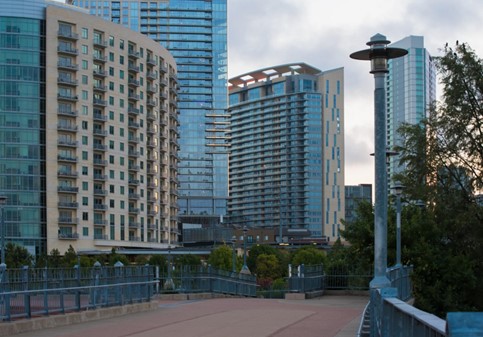According to the U.S. Census Bureau, Austin is the second-fastest-growing major city in Texas, with 171,465 residents moving there between the years 2010 to 2020. Between Austin’s bustling housing market and the market, in general, being so intense, Austin is easily becoming one of the most expensive cities in the whole country. With that being said, any newcomers may need advice on Austin’s housing market and finding the best renter’s insurance in Austin.
Here are useful tips for the Austin housing market if you are looking to rent any time soon.
Table of Contents
Knowing What You’re Looking For
It makes the house-hunting process much easier when you know exactly what you need.
Let’s take a look at the details to consider before elaborating on each one.
- Your budget for rent (don’t forget to factor in utilities)
- If you want/need a roommate(s)
- If your potential roommate(s) will have pets
- How far you are willing to commute to work
- What neighborhoods appeal to you and your lifestyle
- Rooms and layouts that work with your furniture plans (this is especially important if you already own many pieces of furniture)
Sometimes it can be more difficult to find exactly what you want if you are too specific, but it is better to have too specific needs than end up settling with a location or house that does not work for you.
How much of your income should go towards rent?
The typical rule of thumb is that you should not spend more than 33% of your monthly income pre-tax. Most apartments have a 3x income requirement. This means that the renters must have a combined monthly gross income that is 3x of the cost of the monthly rent.
Security Deposit Amounts May Vary
The security deposit amount will depend on the property management company. Austin’s security deposits are typically $300 to $350 on average. However, if you are leasing your home from a private owner, your security deposit could cost as much as a month’s rent.
Finding the Right Roommate
A roommate can help if your ideal house is in an area with higher rent. With that being said, roommate selection is extremely important. You must ensure that whoever you choose as your roommate(s) is reliable and trustworthy. Not only that, but you and your roommate(s) must get along. Having similar lifestyles, or at least being understanding of any differences, ensures that you won’t have major disagreements.
You should determine how you and your roommate(s) split the bills long before the lease is signed. Splitting bills fairly is crucial for avoiding arguments. For example, if one roommate wants cable, but the other won’t watch the TV, it might not be fair to split this bill.
Budgeting With Pets
When it comes to having roommates with pets, you’ll need to factor in their costs. Some places will charge fees for having animals, and others will not allow it at all. Your roommate will also have to consider other expenses related to their pets such as pet insurance when creating their budget.
Deciding on Your Ideal Location
When moving to Austin, Texas, you should research the areas and neighborhoods to determine which ones suit your lifestyle needs best. The last thing you want is to settle into a place only to realize that it is far away from shopping areas, work, or school. Proximity to key locations is important, but what’s even more important is researching the crime in the area.
Crime records are often public, so you can search for the frequency of crime in the areas you are interested in. Another easy way to determine if a neighborhood is risky is simply asking those living there. They will be able to give you the best answers since they are the ones who experience life in the neighborhood every day.
You can also visit the area at night to scope out how the area looks when the sun goes down. Neighborhoods are very different during the day compared to night.
Other things to consider about the location:
- Storage
- Parking
- On-site laundry facilities
- Security gates and guards
- Sufficient nighttime lighting
Keep in mind that you will have more needs to work with the more roommates that you have.
Touring the Property
Looking at listings online is a useful way to spark your interest in a property, but to figure out the space and amenities, you should tour in person.
When touring, you should keep an eye out for the following:
- Air conditioning: Texas is well-known for being so hot, so you should take a look at the air conditioning units inside the properties you are looking at. A newer aircon unit will be more cost-effective in terms of your energy bills;
- Flooring: Depending on how busy you are, renting a place with wood floors or carpeting may not be a smart idea, as these types of floorings require a lot of maintenance;
- Windows: Windows are a huge part of getting proper ventilation in your home, especially when they are newer windows with screens;
- Insulation: Insulation will help with the temperature control inside your home, as well as reduce noise within the home;
- Appliances: Newer appliances are more energy-efficient, cost-effective, and will require less maintenance than a home with older appliances;
- Ceilings: If you are a fan of vaulted ceilings, you have to keep in mind that you will likely end up paying higher energy bills as hot air rises;
- Any future maintenance: If you are looking at apartments, you may not have to worry about maintenance costs as landlords cover most issues. If you’re looking at houses, however, you need to keep in mind any potential issues that would come out of your wallet in the future;
Lastly, you need to know what kind of amenities are available near you. This is especially relevant if you are looking at apartments.
Are you a huge fan of swimming? You may want to find a place that has a pool.
Finding the Best Renter’s Insurance in Austin
Finding renter’s insurance starts with comparing quotes. You can do so for free online, over the phone, or in person with insurance agents. Next, you’ll want to be clear on what is and isn’t covered in your policy and your landlord’s. Ask your insurance representative and your landlord these questions and then some to get a complete picture of your coverage. Renter’s insurance may not be required, but it’s certainly a good idea: It’ll protect you from paying for property damages out-of-pocket and other types of personal liability.
Luke Williams writes and researches for the insurance comparison site, Clearsurance.com. His passions include insurance, studying housing market data, and providing effective tips for those looking to rent and relocate.



